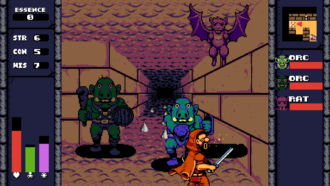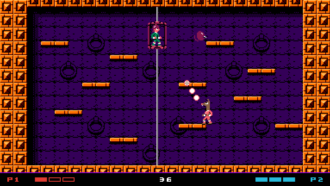Game preservation is entirely messy and poor. Recent studies have compared it to the silent era of film and that retrieving (and preserving) older games can be nigh impossible. Thanks to an excellent recent study from the Video Game History Foundation, it’s been revealed that only 13% of classic games released in the United States are still in print. Many a series of ‘x number games in 1’ collections have done their best to remedy this, reviving older classics without too much of a touch-up to remain authentic. However, none have completed such an effort quite like the newly released UFO 50. The catch? This is a unique collection of fifty games ‘developed’ in the 1980s that technically never existed prior, but certainly feel like they did.
UFO 50 is developed by Spelunky creator Mossmouth, collaborating with other acclaimed indie developers. Fictional studio UFO Soft developed the games within UFO 50’s universe. All fifty of these games were released between the years of 1982-1989. Much like real developers at the time, they were churning out games. Improving their craft and iterating. Authentic to the ’80s era of gaming, all titles within UFO 50 come with their own confines and restrictions, including only using 32 colours. That doesn’t stop the games from being ambitious and creative. The main screen that depicts the list of games chronologically is proof of that when you actively peruse through what a game made in 1983 versus 1988 feels like, for example. There are throughlines, growth and advancements in UFO Soft’s fictional development.
There’s another world out there where UFO 50 was a less involved (but still welcome) project instead made up of fifty microgames. It isn’t, and that’s why development took seven years, but it’s worth it and easy to see why. Games run the gambit. There’s a beat-’em-up resembling Streets of Rage. Bushido Ball (one of my favourites and one of the few I’ve managed to beat) depicts a game of Pong only it is played with a pair of samurai deflecting shurikens and other projectiles back and forth at one another. Expected affairs like run and guns and difficult action platformers are there and with solid depth. Still, Mossmouth has managed to squeeze in even bigger forays such as Grimstone, a fully-fledged Western setting RPG that essentially plays like a classic Dragon Quest or Final Fantasy.
UFO 50 games never feel derivative because they feel so intrinsic to the infancy and experimentation of game design in the ’80s. If Paint Chase, an arcade game that has you fighting over the dominance of painting a field with a racing kart instead of an inkling, were released on the Nintendo Entertainment System back in the day, it would’ve made absolute waves because of its simple but genius design. Pulpy horror mansion-set point-and-click game Night Manor would’ve kept kids in sleepovers in their friend’s basements up at night, the striking image of abandoned halls with blood on the walls burned into their retinas.

As someone born in the late 1990s with next to no attachment or nostalgia to this era of games, UFO 50’s breadth and uniqueness of games still gave me a fantastic attachment rate of experiences to enjoy. One or two (such as idle clicking adventure game Pilot Quest) don’t feel quite of this period but the art and experience is so strong I don’t even care. The one I must shout out and stress players check out the most is Party House. It’s a strategy game that’s essentially a deckbuilder where players are trying to throw a successful party in a limited amount of time. You’re tasked with the tricky balance of buying and unlocking different types of partygoers which adds to the needed popularity threshold you’re eventually working towards crossing. The problem is, that overcrowding and ‘trouble’ parameters caused by guests result in the cops coming round, ending that attempt at a successful party. Quickly Party House becomes an enticing risk vs reward of trying to get the optimum set up of party guests, hoping you can soon unlock an alien as a party guest and send the event’s popularity into the stratosphere.
“UFO 50 games never feel derivative because they feel so intrinsic to the infancy and experimentation of game design in the ’80s”
The most interesting element of UFO 50 however is its fake history and the community that has sprouted around it. As stated prior there’s a throughline that exists through the fictional UFO Soft games, but it’s not just in their growth as a game designer. Some titles are sister cousins to others prior. Campanella, that UFO piloting game you may have loved from ten minutes ago? Might it thrill you to learn it also has two sequels and references to it in other games?! This is only the beginning of fun little factoids you can learn about UFO Soft. Accompanying each game in the menu is a snippet of text that details the development process of the game and how it came to be.
Hidden codes can be found within games. Entering some of them will jump you from one game to another or perform other fascinating oddities. This has the UFO 50 fan subreddit going wild with theories and hunting for secrets to uncover. It’s not entirely clear yet the scope related to this, but this could indicate that this collection is also an ARG (Alternate Reality Game) of such, where what’s on the surface is only a part of the puzzle and will demand players pore over every detail. If that inevitably takes them outside of the game to external sources for bigger pieces of the puzzle, then that’ll just be the icing on the cake.
This is exactly why UFO 50 feels like a phenomenal answer to game preservation. It’s got people talking. I have several friends also playing through this bizarre collection of games at the moment and frequently we’ve referred to each other with recommendations for titles to check out and tips for how to conquer a tough obstacle ahead of us in another. Half the effort of preserving a game is just getting it out there to the people. While that’s still got some room to grow (UFO 50 is currently only on PC and has no physical release), the other half is getting the word of it spread. Mossmouth has more than accomplished that latter portion, fostering a thriving community thanks to its oddities, charm and wonder that spark conversation.
As I played UFO 50 I was frequently reminded of the preservation efforts of modern studios like Digital Eclipse, who have done a wonderful job of creating interactive documentaries and ensuring classic games aren’t lost to time with both physical and digital releases on modern platforms. We live in an era of remakes and remasters. Though a majority of these efforts are earnest attempts at preserving games, they’re arguably flawed and not the true exact product from all those years ago. In a very weird and roundabout way, UFO 50 is preserved almost perfectly. As if being ejected from a time capsule, we currently have in our possession a series of old games that we can play exactly as intended. No ports. No new coats of paint. No fuss. No mess.
We’ve still got a long, long, long way to go with game preservation but with this weird collection of ‘retro’ games that could, at least we’re that one little step closer.











